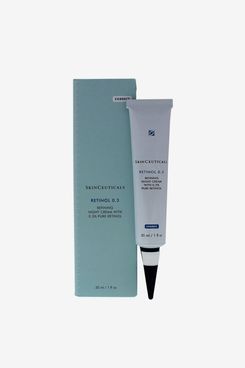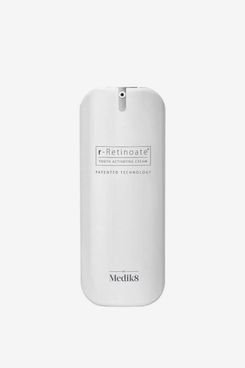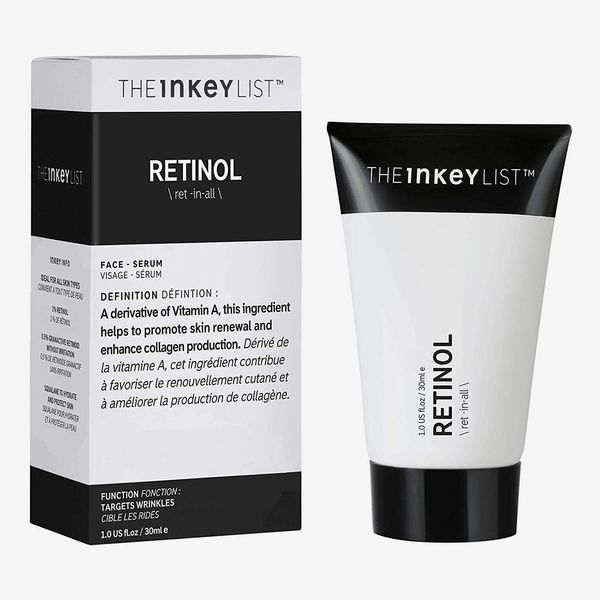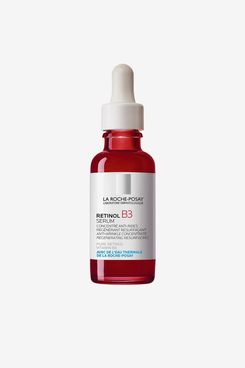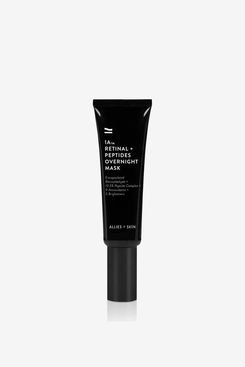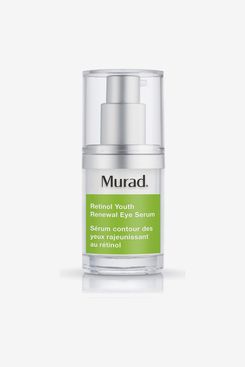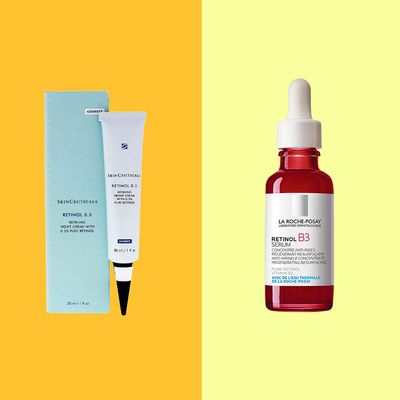
Retinol has been consistently crowned as the gold standard of skin treatment for just about everything. Dermatologists love its clinical pedigree, and consumers love its remarkable results. Previously confined to cosmeceutical circles, it’s broken into the beauty mainstream, with countless serums, creams, and gels on the market. But with that immense selection, there’s also immense confusion, both in terms of what it is, and how it works.
So, we asked six experts, all dermatologists and cosmetic doctors, to explain it and to give their recommendations of the best retinols for every skin type.
“Retinol has become the catchall expression, but retinol is just one of a class of retinoids,” explained dermatology registrar Dr Cristina Soma. Retinoids, which are a class of ingredients including retinal, retinol, and retinol esters, are all derivatives of vitamin A. They share some similar qualities, but there are differences in potency. The strongest, first step, is prescription-only tretinoin or all-trans retinoic acid. (There’s also an oral form, which you might know under the brand name Accutane, which can be prescribed for severe, chronic acne). “The further away from that first step you get, the weaker they become,” explained Dr Soma. Most over-the-counter products are either retinal, which is the second strongest step, or retinol, the third strongest, though the weaker retinol esters are used in some gentler products.
The stronger the derivative, the greater the chance of irritation, be that redness, peeling, or sensitivity, but also, the greater the benefits. “Retinoids are extremely well-studied and there is a lot of clinical research about them, including head-to-head trials with other ingredients,” said Dr Ifeoma Ejikeme, founder of Adonia Medical Clinic. “That’s very unique and we can’t say that about a lot of other ingredients. The end point of retinol is good — it encourages collagen synthesis so helps with fine lines and wrinkles, it helps with pigmentation, it increases cell turnover so it helps thicken the skin, and we have studies to prove all of that. It can be used by so many different skin types from sensitive to oily and mature skin,” Dr Rabia Malik added. “It’s just a wonderful, all-purpose ingredient on so many levels. It works on acne, fine lines, dull skin, it can reduce sebum production. It can be both preventative and corrective. It’s a really good all-rounder.”
The other confusing factor can be the percentage strength listed on the product. The maximum strength that’s allowed over the counter is one percent. However, this doesn’t stop brands from claiming that their product is stronger than that. “Usually, if a brand is claiming a strength above one percent, there’s a lot of small print with that,” said aesthetic physician Dr Ewoma Ukeleghe. Namely, it usually means they’ve added or blended the retinoid with something that they claim makes it perform at a higher strength. All of our experts said that this was misleading, and that you were far better off choosing a product with a clear percentage strength. The other caveat is that retinoids do make the skin more susceptible to sun damage, so it’s especially important to wear a broad spectrum SPF 30 or higher every day while using it (but you should do that, anyway.)
As for which retinoid you need? “Retinal is very effective, and there’s lots of evidence that retinol is very effective too. Your considerations should be how sensitive your skin is, any preexisting conditions, and your budget,” said Dr Soma, adding that because there are more retinols on the market than the other derivatives, you’re perhaps more likely to find one that suits you more easily because of the sheer diversity of choice.
With all of the products below, each doctor advises to start by only using it a couple of times a week, and then look to increase.
Best beginner retinol
New! You can now save this product for later.
If it’s your first time using retinol, all our experts said to start with a low percentage and work your way up. “It can be very sore and uncomfortable if you use too much too soon, and if you have any type of eczema, you need to be especially cautious and seek medical advice,” said consultant dermatologist Dr Hiva Fassihi. Her pick — and consultant dermatologist Dr Anjali Mahto’s suggestion — for a first-time retinol was SkinCeuticals 0.3 percent. “It’s a really good gentle option. I’d recommend it for sensitive skin or anyone who hasn’t used retinoids before and wants something oil-free and simple,” said Dr Mahto. Formulated without any oils, it’s especially good for anyone breakout-prone. “I’ve even been giving a small amount to my 12 year old who gets spots on his nose,” said Dr Fassihi.
Best overall retinol
New! You can now save this product for later.
Dr Ukeleghe, Dr Ejikeme and Dr Malik all recommended Medik8 R-Retinoate as a retinol powerhouse with impressive results. “If you want something really potent, Medik8 R-Retinoate is really good. They’ve managed to harness the power of retinol in a much more non-irritating way. It took the brand eight years to formulate this,” said Dr Ukeleghe. The cream contains a patented retinoid with impressive clinical results. “The creamy texture means it’s well-tolerated by a lot of different skin types, and lots of my patients really enjoy this one” added Dr Ejikeme. “Medik8 R-Retinoate is a great option. You don’t get as much redness or peeling,” explained Dr Malik. “Because it’s in a cream form it’s more moisturising. I think of it as more of a one step wonder, because it’s hydrating, too. It’s potent, but there are some more intense versions if you want to progress up,” she added. Despite it being less irritating than products of a comparable strength, Dr Ukeleghe said if you have sensitive skin, you may want to try a gentler option first before using this.
Best budget retinol
New! You can now save this product for later.
If you can’t bear to spend more than £10 on skin care, Dr Malik suggested The Inkey List Retinol. “For a cheap option, The Inkey List is great. As with all retinols, you’ll need to wait four to six weeks to see results, but it’s a good formulation, widely available online and it’s stable and easy to use,” she explained. This serum has a stabilised retinol called RetiSTAR™ which also includes vitamin E to help soothe and hydrate the skin, and Dr Malik noted that it also has squalane to help make it hydrating.
Best retinol for sensitive skin
New! You can now save this product for later.
Sensitive skin types can have an especially difficult time finding a retinoid that won’t cause a reaction, but Dr Ukeleghe and Dr Fassihi both suggested La Roche Posay Retinol B3 Serum. “Everyone’s experience with retinol is different and it’s about finding a strength and a product you can tolerate without needing to hugely overcompensate with moisturiser or suffer extreme dryness. This is a great, gentle formulation for anyone with very sensitive skin,” said Dr Fassihi. “It’s 0.1 percent pure retinol, and 0.2 percent gradual release retinol,” explained Dr Ukeleghe. “It’s got vitamin B3 which is great for restoring barrier function and minimising irritation and some glycerin in there for added hydration.”
Best retinol for plumping
New! You can now save this product for later.
For a production that combines the rejuvenating power of retinol with extra plumping and hydrating, Dr Soma and Dr Mahto both suggested Allies of Skin 1A Mask. “It’s an overnight mask with lots of active ingredients embedded in a very hydrating formula to reduce irritation,” said Dr Soma. “It has glycerin which reinforces the skin barrier and keeps it hydrated. It also contains several peptides which can help increase moisture in the skin and deliver active ingredients to deeper levels. The active retinoid is 0.05 percent retinal, which is one the stronger derivatives,” she noted. Dr Mahto added, “The peptides add a sort of plumping, smoothing effect, and the retinal is encapsulated to minimise irritation. This would be good for mature skin or anyone who’s looking for immediate hydration.”
Best retinol eye cream
New! You can now save this product for later.
The skin around the eyes is the thinnest on the body, so extra caution is needed. That being said, it’s often the first area to show fine lines and fatigue, so retinoids can be very beneficial. Dr Mahto said she personally used Murad Retinol Eye Cream, which uses the less aggressive retinol esters. “This area is so delicate, but I can use the Murad Retinol Eye Cream every night. It gives lots of the benefits of retinol, so fine line reduction and cell turnover without being too harsh.”
The Strategist UK is designed to surface the most useful, expert recommendations for things to buy across the vast e-commerce landscape. Read about who we are and what we do here. Our editors update links when possible, but note that deals can expire and all prices are subject to change.
